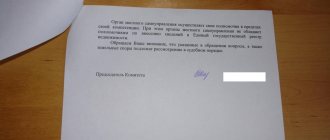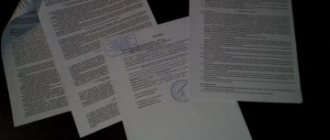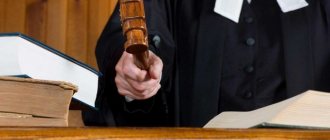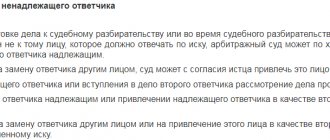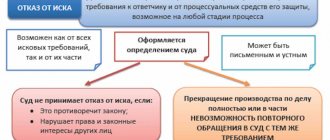Are you looking for how to write an application to correct a typo in a court decision? Misprints and arithmetic errors are sometimes found in court decisions in civil cases. Therefore, there is no need to worry too much. Of course, you will have to spend a little time and go to court again. Up-to-date information on the procedure for drawing up and submitting such an application to the court can be found below.
A court decision in itself is not a document on the basis of which enforcement proceedings are initiated. But the writ of execution is prepared precisely on its basis. Making entries in the writ of execution and receiving it in the hands of the winning party in accordance with the application for the issuance of a writ of execution will be carried out in strict accordance with the text of the decision.
If you find a typo in the installation data, addresses, list of property and other legally significant circumstances, or arithmetic errors, use the example below. Additional questions can be directed to the duty lawyer.
:
Application to correct a typo in a court decision
Is it necessary to file an application to correct a typo in a court decision?
After the decision has been announced and made in full, the court has no right to change or supplement it. The exception applies to cases where it is necessary to correct typos, arithmetic errors in calculations, as well as the grounds for issuing an additional decision. A fundamentally different decision can be made only after consideration of a well-founded appeal. Or a cassation appeal, an appeal by way of supervision.
Therefore, an application to correct a clerical error in a decision or obvious arithmetic errors cannot be intended to change the court’s decision on the merits. If, in your opinion, the court applied the wrong calculation formula, the wrong bank rate when collecting a penalty, etc., an application to correct a clerical error in the court decision will not help.
So, some typos have been found. You can try to draw the attention of the court secretary or assistant to any inaccuracies. The court has the right to make changes on its own initiative. To be sure, prepare a written official document.
Does the judge have the right to make a mistake?
He who does nothing makes no mistakes - a simple and understandable saying.
A judge makes decisions every day, and every decision carries the risk of error.
You can object - the judge represents the authorities and should not make mistakes.
Yes, he shouldn’t, but sometimes he makes mistakes and there’s nothing you can do about it.
Therefore, the law provides for a multi-stage review of court decisions - appeal and cassation, and in some cases supervision.
The probability of making a mistake in several instances is extremely low, but not zero. Even the Supreme Court makes mistakes. And nothing can be done about this.
How to write an application to correct a typo in a court decision
An application to correct a clerical error is drawn up simply and does not require the applicant to provide additional evidence to the court - all documents are stored in the case file. It is enough to indicate exactly what errors were found and where the arithmetic error was made.
The application is submitted to the court that examined the case on the merits and made a decision. You can send it by post and receive a postal notification that the letter has been delivered. Can be submitted through the court office. In the latter case, place a stamp on the second copy of the application confirming acceptance of the document.
What is the deadline for submitting an application?
The law does not limit the parties to statute of limitations or otherwise. That is, the court may agree to the correction, but this will not restore the deadline for its presentation for execution.
The legislator's reluctance to establish additional restrictions is based on the risk of complicating judicial procedures.
The Code of Civil Procedure does not say anything about deadlines. However, this does not give judges of general jurisdiction greater freedom.
Consideration by the court of an application to correct a clerical error in a decision
Since October 2021, the court has not held a court hearing on the issue of correcting clerical errors. He himself considers the received application within 10 days. Therefore, if the applicant would like to further clarify something or explain a complex arithmetic calculation, we recommend that everything be stated in the document at once.
Based on the results of consideration of the application to correct the clerical error in the court decision, a ruling is issued. It comes into force after 15 working days (Article 107 of the Code of Civil Procedure of the Russian Federation). During the specified time, any of the parties to the case has the right to file a private complaint against the court’s ruling on an application to correct a clerical error in the court’s decision.
Application requirements
The application is drawn up in free form in compliance with the rules for drawing up standard documents.
- I should have grammatical and other errors in it;
- The circumstances and request must be stated in compliance with the principles of business style, avoiding deviations from the topic and extraneous information;
- You should refrain from using slang expressions, rudeness, colloquialisms and direct threats;
- The essence of the problem is briefly stated - the text of the document contains an error that prevents the execution of the court order;
- At the same time, attempting to demand a change or review of a court decision in a petition is prohibited. This is a separate procedure and requires an appeal.
Significance of the typo
If we continue the example with an incorrectly written middle name, then replacing the middle name “Vladimirovich” with “Ivanovich” in the decision will be an unconditional basis for filing an application for correction.
However, a typo, expressed in an unintentional and insignificant distortion of the same patronymic “Vladimirovich” to a degree that does not interfere with correct perception (for example, “Valdimirovich”), essentially does not require any corrections.
However, if a party wants the middle name to be indicated correctly, then it may well submit an application to correct the typo.
As for material errors in a court decision, it is the choice of the parties to write or not to write a statement of correction. It is certainly better for the prevailing party to ask for an amendment. As for the losing party, it would be strategically correct for it to point out the error in the appeal.
To the Arbitration Court of the Omsk Region
Plaintiff: Housing and construction cooperative "Omich-2", 644007 Omsk, st. Herzen, 79
Defendant: Individual entrepreneur Goppe Snezhana Anatolyevna, 644007 Omsk, st. Frunze corner Ordzhonikidze, 49/46, apt. 59
claim price: 2,969,960 rubles
representative of the plaintiff in case No. 46-1506/2011
Typo correction request
By the decision of the Arbitration Court of the Omsk Region dated... in case No. A46.... the claim of the plaintiff, the Omich-2 housing cooperative, was partially satisfied: it was decided to oblige the defendant Goppe S.A. to dismantle advertising structures from the facade of the apartment building; to recover from the defendant unjust enrichment for the illegal use of the facade of the building, which is the common property of the owners of the premises of the house, for the purpose of advertising.
By the decision of the Eighth Arbitration Court of Appeal dated ....g. The decision of the Arbitration Court of the Omsk Region dated ... was left unchanged, the defendant’s appeal was not satisfied.
….G. The bailiff for the Central Administrative District No. 1 of Omsk, the Federal Bailiff Service of Russia for the Omsk Region M., on the basis of the writ of execution No. AS ..... initiated enforcement proceedings No. .... in relation to S.A.
As of the date of filing this application with the Arbitration Court of the Omsk Region, the bailiff carried out a number of enforcement actions, in particular, sent requests to the regulatory and registration authorities about the availability of property from the debtor - S.A.
Meanwhile, the court (as well as the plaintiff in the statement of claim) made a typo in the defendant’s patronymic: according to the citizen’s passport, the debtor’s full name is Snezhana Anatolevna (i.e., without the letter “b” in the patronymic). This became known when the representative of the claimant familiarized himself with the materials of the enforcement proceedings (a copy of Goppe Snezhana Anatolevna’s passport in the materials of the enforcement proceedings No. ...)
This typo is obvious, because all other individual details of the person indicated in the court decision and in the extract from Egypt coincide, in particular, Taxpayer Identification Number: ..., date of birth: .... and place of residence: ...
In addition, it should be taken into account that the letter “b” in the defendant’s patronymic is indicated in the following documents available in the materials of case No. A46-….:
1) lease agreement dated...;
2) passport of advertising space No. ... issued to Goppe S.A. by the real estate department of the Omsk City Administration;
3) review, appeal, cassation complaint, application for distribution of legal costs, application for reconsideration of the case due to newly discovered circumstances, signed by a representative (in all documents the patronymic name is written with the letter “b”)
The indication in the extract from the Unified State Register of Individual Entrepreneurs of the defendant’s middle name without the letter “b” was considered by the plaintiff in connection with the above as a typo made by the tax service.
In addition, it should be taken into account that the absence of the letter “b” is not typical for the defendant’s patronymic, and therefore, when reading the surname, first name and patronymic as a whole, the absence of a “soft sign” is not visually perceived.
In accordance with Part 3 of Article 179 of the Arbitration Procedure Code of the Russian Federation, the arbitration court that made the decision, at the request of the person participating in the case, the bailiff - executor, other bodies, organizations executing the decision of the arbitration court, or on its own initiative, has the right to correct clerical errors in the decision. and arithmetic errors without changing its content.
Failure to correct this typo will result in the impossibility of executing the decision of the Arbitration Court.
Based on the above, I ask the court:
correct the typo, indicate in the ruling that the court decision in case No. 46-1506/2011
1) obliged to Goppe Snezhana Anatolevna (... year of birth, native of the city ..., registered at the address: ..... (TIN ..., OGRNIP ...)
2) in favor of the Housing and Construction Cooperative "Omich-2" are subject to recovery... rub. unjust enrichment, as well as... expenses for payment of state duty from the defendant - Goppe Snezhana Anatolevna (... year of birth, native of the city of ..., registered at the address: ... (TIN ..., OGRNIP ...)
Appendix: 1. photocopy of the title page of case No. ... (enforcement proceedings No. ...); 2. photocopy of citizen S.A.’s passport from the materials of enforcement proceedings No. ... 3. copy of the representative’s power of attorney
Housing cooperative representative _______________ / ……../
All procedural documents in this case:
Written arguments to the court of the plaintiff in the case of dismantling advertising structures (about the invalidity of the agreement “lease of the ends of the building for advertising, concluded between the chairman of the housing cooperative and the defendant; about the authority of the housing cooperative to bring a claim in court);
Written arguments to the plaintiff's court - 2 in the case of dismantling advertising structures (on the grounds for the invalidity of the lease agreement for the ends of the house, concluded between the housing cooperative represented by the chairman of the housing cooperative and the defendant);
Decision of the Arbitration Court of the Omsk Region dated June 2, 2011 in case No. A46-1506/2011 (on the obligation to dismantle and recover unjust enrichment);
Response to the defendant’s appeal in the case of the obligation to dismantle advertising structures and the recovery of unjust enrichment for the use of the facade of a residential building;
Resolution of the Eighth Arbitration Court of Appeal dated August 25, 2011 in case No. A46-1506/2011 (the decision of the Arbitration Court dated June 2, 2011 was left unchanged)
Response to the appeal against the arbitration court ruling to return the application for review of the decision due to newly discovered circumstances
Application for correction of a typo (in the statement of claim, and then in the court decision, there was a typo in the defendant’s patronymic: “Anatolyevna”, while in the citizen’s passport “Anatolevna” - without the letter “b”)
Response to the defendant's cassation appeal in the above case;
Resolution of the Federal Antimonopoly Service of the West Siberian District dated November 23, 2011 (the decision of the Arbitration Court dated June 2, 2011 and the resolution of the Eighth AAS dated August 25, 2011 were left unchanged)
For examples of claims for dismantling and collection, comments, see the section “Common property in an apartment building”
Drawing up an application
Any application to the court in its structure corresponds to the structure of the statement of claim and includes the following structural elements:
- the name of the court that made the decision containing the clerical error or error;
- Full name (or name) of the applicant indicating the address and procedural status;
- Full name (or name), address and procedural status of the opposing party to the process:
- a descriptive part that indicates the case number, the date of the decision or sentence, the essence of the claim and its parties, or the full name of the defendant and the article of accusation;
- a motivational part, in which specific clerical errors or errors in the text of the decision should be pointed out, which the applicant considers significant and requests to be corrected;
- the actual request for correction;
- date of application and signature of the applicant.
The application is submitted either in person to the office of the trial court, or by mail via registered mail with return receipt requested.
Procedure for consideration
Having received an application to correct an error, the court considers it without holding a court hearing or summoning the parties (Article 203.1 of the Code of Civil Procedure of the Russian Federation). However, if additional clarification is necessary, the court may schedule a court hearing and summon the participants in the process to it.
The application is considered by the court within 10 days from the date of its receipt. Based on the results, a decision will be made to correct the clerical error or to refuse the application. The ruling must be sent to the participants in the process within 3 days after it is issued.
Error in arithmetic: explicit and implicit
Judges don't have time to sit with a calculator and do or check complex calculations.
Judges entrust especially complex tasks, such as checking accounting or tax records, to experts.
The calculation is provided by the participants in the process. The judge either agrees with him or makes his own.
Anyone can get shortchanged. We must not forget that the majority of judges are humanists not only by education, but also by their type of thinking.
An arithmetic error is an error in mathematical calculations.
They multiplied incorrectly, put a comma in front of the decimal place in the wrong place, added up the wrong values, and finally just lost a zero.
An obvious arithmetic error is an obvious, gross error that can be identified by a person with a high school level of knowledge in arithmetic.
Almost all errors are obvious. Therefore, there is no need to bother your head with the question: “Did the judge make an explicit or implicit arithmetic error?”
What to do if the result is not satisfactory
A court ruling to correct a typo or obvious arithmetical error, or to refuse this request, comes into force immediately. If it is necessary to appeal such a determination, this must be done in a cassation court (Resolution of the Plenum of the Supreme Court of the Russian Federation dated June 19, 2012 No. 13 “On the application by courts of the norms of civil procedural legislation regulating proceedings in the court of appeal”).
A private appeal against the ruling will be considered by the cassation court, as a result of which the ruling to correct an error or clerical error may be cancelled.
